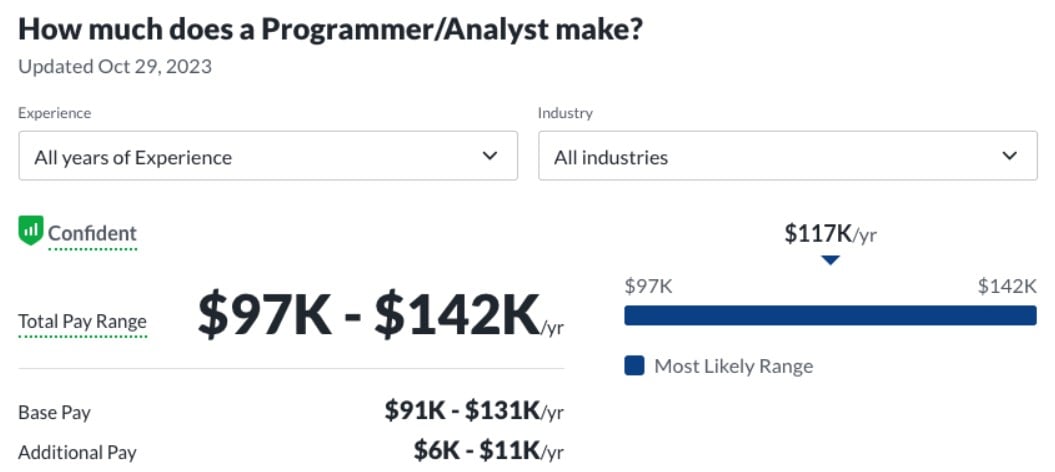If you’re a natural problem solver with an affinity for technology, then you should definitely consider a career as a programmer analyst. In today’s digital age—where software applications power every facet of our lives—the demand for skilled programmer analysts is soaring. Organizations are seeking professionals who can bridge the gap between coding expertise and business acumen. According to the U.S. Bureau for Labor Statistics, the employment of programmer analysts is projected to grow by as much as 25% in the next ten years.
But what does it take to become a programmer analyst, and how does this role compare to that of a software developer? Unlike traditional career paths with specialized degrees, the route to programmer analyst may seem less defined. In this comprehensive guide, we’ll unravel the essential steps, technical skills, and insights needed to embark on a successful programmer analyst career.
What Does a Programmer Analyst Do?
Programmer analysts bridge the gap between coding and business analysis. They are responsible for designing, coding, and maintaining software applications while also addressing the specific needs of an organization. Programmer analysts use their technical expertise to create efficient and effective solutions that align with business objectives. They also analyze user requirements, develop software solutions, and ensure that applications run smoothly.
Programmer Analyst: Role and Responsibilities
Programmer analysts have a varied list of responsibilities. Let’s get into the details.
What Does a Day in the Life of a Programmer Analyst Look Like?
A typical day in the life of a programmer analyst is a blend of coding, problem-solving, and collaboration. These professionals often find themselves working in a dynamic environment where they balance technical tasks with teamwork and analysis. A typical day may involve:
- Requirement Analysis: Programmer analysts begin by reviewing user requirements and project objectives. They work closely with business stakeholders to understand the specific needs and constraints.
- Coding and Development: Much of the day is spent writing, testing, and debugging code. Programmer analysts use various programming languages and development tools to create software solutions.
- Problem-Solving: When issues arise, programmer analysts use their analytical skills to troubleshoot and resolve software problems efficiently.
- Collaboration: Effective communication is key. Programmer analysts often collaborate with cross-functional teams, discussing project progress, sharing insights, and ensuring alignment with business goals.
- Documentation: They maintain detailed technical documentation to facilitate future updates and provide references for team members.
- Quality Assurance: Ensuring the quality and reliability of software is paramount. They conduct rigorous testing and review processes.
- Project Management: Programmer analysts may also participate in project management activities, tracking timelines, and contributing to project planning.
Overall, a day in the life of a programmer analyst is dynamic, demanding creativity, analytical thinking, and strong technical skills. It’s a role that combines the excitement of coding with the satisfaction of solving real-world business challenges.
Programmer Analyst Job Description
Most job descriptions for programmer analyst jobs list the following roles and responsibilities:
- Coding and Development: Writing, testing, and maintaining code to create software applications
- Analysis: Evaluating user requirements, identifying business needs, and proposing technical solutions
- Troubleshooting: Debugging and resolving software issues and ensuring the smooth functioning of applications
- System Integration: Integrating new software with existing systems and databases
- Documentation: Creating and maintaining technical documentation for reference
- Collaboration: Collaborating with cross-functional teams, including business analysts and project managers
- Adaptation: Staying up-to-date with technology trends and adapting to new programming languages and tools
You’ll often find the following qualifications listed on programmer analyst job descriptions:
- A bachelor’s degree (or consummate educational experience) in computer science or a related field.
- Strong programming skills in languages such as Java, C++, or Python.
- Analytical thinking and problem-solving abilities.
- Excellent communication and teamwork skills.
- Knowledge of software development methodologies.
- Attention to detail and a commitment to quality assurance.
- Adaptability to learn and apply new technologies.
How To Become a Programmer Analyst: A 7-Step Guide
Here’s our 7-step guide to becoming a programmer analyst.
-
Get Educated
-
Build Your Skillset
-
Get Experience
-
Pursue a Certification
-
Network
-
Find a Mentor
-
Start the Job Hunt
Get Educated
Whether you’re making a career pivot or at the beginning of your working life, it’s essential to meet the educational requirements before you can become a programmer analyst. It used to be the case that a bachelor’s degree in computer science or information technology was a prerequisite. But you can also gain the skills you need by enrolling in specialized courses, certifications, or bootcamps.
Build Your Skillset
As a programmer analyst, continuous skill development is vital. Focus on building expertise in the following technical and soft skills:
Technical Skills
- Programming Languages (e.g., Java, Python, C++)
- Database Management (SQL, NoSQL)
- Data Analysis and Visualization
- Software Development Lifecycle (SDLC)
- Web Development (HTML, CSS, JavaScript)
- System Integration
- Debugging and Troubleshooting
- Version Control (e.g., Git)
- Object-Oriented Design
- Cloud Computing Platforms (e.g., AWS, Azure)
Soft Skills
- Problem-Solving
- Communication
- Critical Thinking
- Team Collaboration
- Adaptability
- Time Management
- Attention to Detail
- Creativity
- Analytical Thinking
- Leadership (when required)
Get Experience
Though there are entry-level programmer analyst positions available, they usually require some experience. You can begin your journey by securing a junior programmer analyst position or a related entry-level programming role. Here, you’ll gain practical experience, work with real-world project requirements, and hone your skills. Be prepared to learn and adapt as you gradually take on more responsibilities, eventually advancing your career in the field.
Pursue a Certification
Certifications can greatly boost your credibility and career prospects as a programmer analyst. Consider obtaining certifications such as:
- Certified Computer Programmer (CCP)
- Oracle Certified Professional (OCP)
- Microsoft Certified: Azure Developer Associate
- Certified Information Systems Security Professional (CISSP)
These certifications validate your expertise and show potential employers your commitment to staying current in this dynamic field.
Network
Networking and community involvement are key to a successful career as a programmer analyst. Here are some strategies to expand your professional reach and engagement.
LinkedIn is a powerful platform for connecting with industry professionals. Build a robust profile, join relevant groups, and actively engage by sharing insights and connecting with fellow programmer analysts and potential employers.
Conferences and Meetups
Attending industry-specific conferences and local meetups provides opportunities to learn from experts, exchange ideas, and establish valuable connections within the programmer analyst community. Stay updated on events in your area and make the effort to participate.
Online Communities
Online forums, such as Stack Overflow, GitHub, and Reddit, offer platforms to interact with peers, seek advice, and contribute to discussions. Engaging in these communities can help you stay informed about emerging trends and connect with like-minded professionals.
Find a Mentor
Seeking a mentor in the field of program analysis can be a transformative step in your career journey. A mentor can provide guidance, share valuable insights, and help you navigate the complexities of the profession. Look for experienced programmer analysts within your network or professional circles, and don’t hesitate to reach out for mentorship. This kind of relationship can be instrumental in helping you refine your skills and accelerate your career growth.
Start the Job Hunt
Beginning your job search as a programmer analyst requires careful preparation and execution. Here are some crucial steps to ensure a successful job hunt.
Update Your Resume and LinkedIn Profile
Craft a compelling resume highlighting your skills and relevant experiences relevant to the programmer analyst role. Ensure that your LinkedIn profile mirrors your professional achievements, emphasizing your expertise in programming, analysis, and problem-solving.
Prepare for Interviews
Prepare thoroughly for job interviews by researching the company, understanding the role, and rehearsing your responses to common interview questions. Be ready to discuss your technical skills and demonstrate your ability to solve real-world problems.
Follow Interview Best Practices
During programming interviews, maintain professionalism, showcase your passion for the role, and ask insightful questions about the company and its projects. Follow up with a thank-you note to express your continued interest in the position.
Get To Know Other Software Engineering Students
Geraldo Gomes
Software Engineer at Affirm
Julia Ayres
Software Engineer at Northspyre
Tetyana Ilyichova
Software Engineering Apprentice at Affirm
What Is the Average Salary of a Programmer Analyst?

As a programmer analyst in the United States, you can expect to earn an average salary of around $113,285 per year. This is the average across all years of experience, but for entry-level roles, you may start with a salary closer to $90,000 and work your way up. If you score a job with a well-paying company in a high-salary state, you could earn as much as $169,000.
What Does the Career Path of a Programmer Analyst Look Like?
The career path of a programmer analyst typically follows several distinct stages, each marked by increasing responsibilities, skills, and opportunities. Here’s an overview:
1. Entry-Level Programmer Analyst:
- Begin as a junior programmer analyst or related role.
- Focus on learning programming languages and basic analysis techniques.
- Work on small to medium-sized projects under the guidance of senior colleagues.
2. Intermediate Programmer Analyst:
- Gain more experience in coding and analysis.
- Take on larger projects and contribute to system integration efforts.
- Develop expertise in specific programming languages and technologies.
3. Senior Programmer Analyst:
- Lead projects and oversee junior team members.
- Engage in complex software development and analysis tasks.
- Play a role in decision-making and project planning.
4. Lead Programmer Analyst:
- Assume a leadership position, managing teams and projects.
- Drive technical strategy and innovation within the organization.
- Collaborate closely with business stakeholders and IT leadership.
5. Specialized Roles:
- Some programmer analysts specialize in areas like data analysis, cybersecurity, or software architecture.
- They become subject matter experts in their chosen field.
6. Management or Architectural Roles:
- Progress to roles such as IT manager, systems architect, or technical staff lead.
- Focus on high-level decision-making, project management, and architecture design.
Programmer Analyst FAQs
Here are some of the main questions you might be thinking of if you’re getting ready to enter the field of programmer analysis.
How Hard Is It To Become a Programmer Analyst?
Becoming a programmer analyst requires dedication and continuous learning. It can be challenging, but with the right education and perseverance, it’s an attainable goal.
Does a Programmer Analyst Code?
Yes, programmer analysts extensively code to develop and maintain software applications. Coding is a fundamental part of their daily tasks.
Do You Need a Degree To Become a Programmer Analyst?
While not always mandatory, a bachelor’s degree in computer science or a related field is typically preferred by employers. It provides a strong foundation for the role.
Who Does a Programmer Analyst Report To?
Programmer analysts often report to IT managers, project managers, or senior software developers, depending on the organization’s structure.
What Is the Difference Between a Programmer Analyst and a Data Analyst?
Programmer analysts focus on developing software applications, while data analysts primarily work with data to derive insights. Programmer analysts combine coding with analysis, whereas data analysts specialize in data interpretation and visualization.
Since you’re here…
Interested in a career in software engineering? Join our mentor-led Software Engineering Bootcamp or our foundational Software Engineering Course if you’re just starting out. We help people make the switch every day (just peep our reviews). You can do it, too!




![How to Become a Front-End Developer in 2023 [Career Guide]](https://www.springboard.com/blog/wp-content/uploads/2023/02/how-to-become-a-front-end-developer-in-2023-career-guide.jpg)

